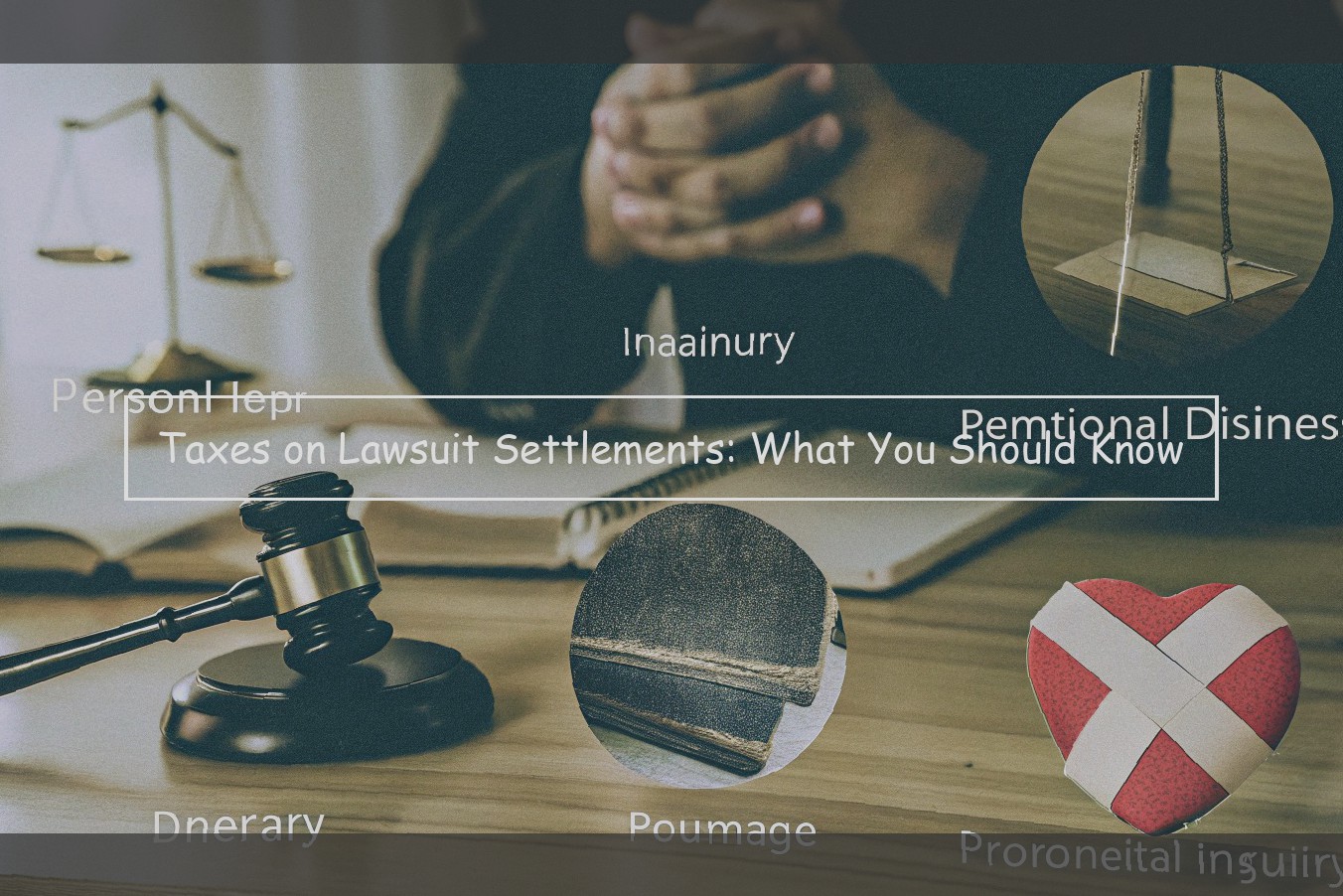Taxability of Settlements in Lawsuits
Taxable Lawsuit Settlements
As a general rule, payments made to an individual as a result of the settlement of a lawsuit are considered taxable income for plaintiffs and deductible to defendants. For example, if a plaintiff settles his or her employment discrimination case for $100,000, the money is considered taxable income to the plaintiff and deductible to the employer. Exact rules apply to other types of cases too. Exceptions do apply; for example, if the payment is made to a charity , it is not considered taxable income to the recipient. The characterization of the payment – whether it’s for lost wages or compensating the recipient for physical damages, for example – also plays a role in how it is taxed. The origin-of-the-claim rule is a common one to establish the taxability of the payment. Its aim is to determine the true nature of the claim settled. Does it seek to settle a claim for lost wages, lost asset value, capital assets, lost profits, etc.?

Settlement Types and Their Tax Consequences
Different types of lawsuit settlements are treated differently for tax purposes. Lawsuit settlements can involve personal injury, emotional distress, property damage, or punitive damages, and the manner in which the recovery is received is crucial.
Personal Injury Lawsuit Settlement Taxation
Most people have heard that lawsuit settlement proceeds involving physical harm are not taxed. This is because the Internal Revenue Code section 104(a)(2) reads: In the case of a civil action…on account of personal physical injuries or physical sickness, no gain or loss shall be recognized on a transfer effected pursuant to a suit or agreement of a type which would be described in section 104(a)(2). For purposes of this subsection, an amendment made by this paragraph shall not apply to settlements entered into before the date of the enactment of this paragraph.
The answer to whether the injury is physically harming or not has a two prong test. First, a physical injury or sickness is generally considered an observable bodily harm, the impairment of the function of a bodily part, or the physical damage to a tangible property.
Second, the injury must be physical, observable, and perceptible. This can include the aggravation of a preexisting condition or mental distress that is manifested into a physical disease.
Emotional Distress Personal Injury Lawsuit Settlement Taxation Lawsuit settlement proceeds involving emotional distress can also be excluded from income taxiness if the emotional distress was caused by the physical injury (next section) or was not physical in nature.
If the injury is physical, the proceeds are excludable from income if they are for: Pain and suffering or other emotional distress The costs involved in medical treatment, due to emotional distress. If the lawsuit proceeds are not physical in nature the general rule that they can be included in income tax. However, there are some exceptions for disability payments.
Punitive Damages Lawsuit Settlement Taxation Purpose The general rule is that punitive damages must be included in income. However, there are some exceptions.
Compensatory and Punitive Damages
As the name implies, compensatory damages are designed to provide compensation for injuries or loss. As such, they are primarily intended to put the plaintiff back in the position she would have been in had the wrongful action not occurred. Some clear examples of compensatory damages are: Usually, compensatory damages are not taxable because they are purely to redress a loss.
Contrasted with this is a punitive award, which is generally made to punish, discipline or warn. Punitive damages are imposed to deter the defendant and others from committing similar actions. Neither the harm to the plaintiff nor out-of-pocket expenses are relevant to determining the amount. Some examples of cases where punitive damages may be awarded include: Although the plaintiffs are the primary beneficiaries of punitive damages, these are generally nontaxable to the plaintiffs. Since the award is made to punish the defendant rather than for the plaintiffs’ benefit, the damages neither represent nor augment their income.
IRS Settlement Tax Guidelines
Guidelines and Rules from the IRS on Lawsuit Settlement Taxation
One of the biggest concerns many plaintiffs in a settlement like yours have is what tax they will have to pay for the settlement. Any lawsuit settlement can be taxed, so plaintiffs should not think they are now in the clear to get any money they want. Generally, plaintiffs should expect to pay taxes based on their settlement amount.
However, if you work with an attorney, you likely have shared your financial and medical documents that may allow you to receive some tax breaks. When you visit the IRS website, you can see that the general tax rules state that lawsuit settlements are taxed the same way that wages are taxed. Wages are taxed at the end of the year, so lawsuit settlements should be taxed in the same manner. If you receive a lawsuit settlement in 2019, then you pay taxes on it in 2019 as well.
There are exceptions to this, and other rules for these lawsuits. The IRS has documented these exceptions and more in the document 4667, titled "Lawsuit Awards and Settlements." In it, you can find subsections that clarify the rules in regard to personal injury awards, personal sickness, wrongful death, basis recovery, punitive damages, interest, and breach of a contract.
If you want to learn more about the legal and tax ramifications of a lawsuit settlement like yours, you should check this document out. You may find clarification that can save you significant money, and you may even learn that your entire lawsuit settlement isn’t taxable after all.
Save Money by Following IRS Guidelines
There are a number of strategies to minimize your tax obligation or the taxable element on your lawsuit settlement. The facts, circumstances and types of damages alleged are key to determining how to optimize this strategy.
An experienced and competent attorney will assist you in evaluating and implementing these strategies. You may be able to allocate settlement proceeds to specific elements of your damages or loss, such as pain and suffering, economic loss or punitive damages – components that may be taxed differently or not at all under applicable law . The allocation of settlement proceeds must be made to occur on an appropriate basis based on the damages incurred.
It is important to bear in mind that the Treasury Department can (and does, on occasion) object to your strategy and filing, even if it is legally sound and is lodged in good faith. An attorney who regularly works in this area of the law will know how best to accomplish your goal in a way that avoids unnecessary obstacles and delays.
Consultation with a Tax Professional
While this post is intended to provide a general overview on Lawsuit Settlements and Taxes, I highly suggest, to my clients and readers, to always consult with a tax professional or attorney to ensure they fully understand how their lawsuit settlement will be treated for tax purposes, and any possible tax obligation they may have. As an attorney, I can speak about the law and cases in general, but I am not a tax professional and cannot provide accounting advice. There are often different ways to treatment for tax purposes that can impact clients in different ways. It is always best to seek professional accounting advice if you have concerns about your case and taxes. Never take "off the shelf" general advice from your attorney or other non-CPA professionals when it comes to taxes. The better your professional team, the better you are protected.
Lawsuit Settlement Examples
An article in the Harvard Law Review by John H. Armour, Henry G. Manne, and Jeffrey M. Lipshaw provide the information necessary to determine if a lawsuit settlement is taxable. The Harvard Law Review article explains the three types of liability arising from a given tort: First-party torts are those for which the plaintiff has an independent right to recover damages . . . . Personal injury torts are those that arise from the violation of a recognizably bodily interest . . . . Finally, we have liabilities for the breach of an economic obligation. These categories help lawyers and their clients understand whether a lawsuit settlement is non-taxable. First-party torts include things like insurance claims where the seller harmed a buyer, or a dog’s injuries from a dog bite at a neighbor’s house. Second-party torts include malpractice lawsuits where lawyers harm their clients. Third-party torts include sued by a consumer or a company for breach of contract or fraud. For tax purposes, only first-party torts are non-taxable. For example, a car accident where the driver claims he was rear-ended by another driver, who then sues for his medical bills, lost wages, or property damage would be a first-party tort, and any settlement of the claim would be non-taxable. A doctor suing his patient for a failure to pay a bill would be a second-party tort, and any settlement the doctor would receive would be taxable. A lawsuit that a vendor initiates against a construction company would be a third-party tort. Modifying the model from the Harvard Law Review article a bit, tax expert Ed Zollars explains how these categories apply differently to various types of settlements: "Non-Taxable" (first party torts): "Taxable" (second and third party torts): Of course, it’s not always so clear-cut. What if the settlement agreement doesn’t even mention the tort for which damages are being paid? The Tax Court in Campbell v. Commissioner, 56 T . C. 1 (1971), determined that it was the substance of a settlement agreement that controls, not the mere labels used. Tax Settlement Categories Explained using the Fact Pattern of Campbell v. Commissioner Contributor Ed Zollars takes a close look at the tax treatment of settlement agreements using a 1971 Tax Court case, Campbell v. Commissioner, as a guide. This case and the settlement fact pattern that resulted from it provides insight into how the IRS chooses to tax various settlement agreements. The basic fact pattern starts with a doctor who found out that one of his employees was taking kickbacks from a referral source. The physician advised the kickback recipient to resign; the employee refused and was discharged. The kickbacker filed suit against the doctor and others, seeking damages for wrongful termination and pain and suffering. The doctor and his insurer settled the case, paying the ex-employee $15,000. The IRS later reviewed the fact pattern of the Campbell settlement and allocated the full payment as taxable as not being due to a first party tort but to a third party tort (wrongful termination). The settlement agreement characterized the $15,000 check as being for "wrongful discharge of employment", but the IRS ignored that characterization and said that the $15,000 came from the breach of a contract (the employment contract) and thus was taxable. The Tax Court agreed, and held that the full $15,000 was taxable due to the following: The return of an employee after refusing to resign constituted a breach of a contractual duty to resign. The resulting suit was thus one arising in contract although damages were claimed for pain and suffering. Where a compromise or, as this one was styled, a settlement is entered into in respect to a contract right the resulting payment must be included by the taxpayer in gross income to the extent it did not arise from a compensable injury to the taxpayer.



